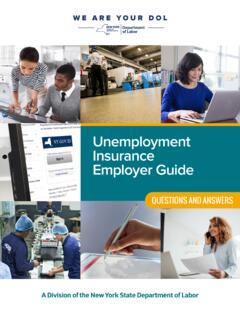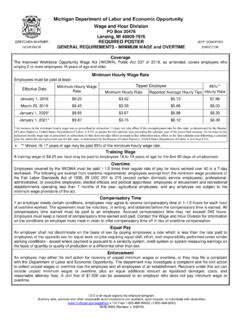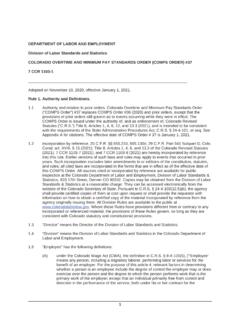Transcription of Executive Employee Overtime Exemption Frequently Asked ...
1 Executive Employee Overtime Exemption Frequently Asked Questions (FAQ) Both federal law (Fair La bor Standards Act or FLSA) and state law (New York Minimum Wage Act and applicable regulations) generally require the payment of Overtime wages for work performed after 40 hours per week. The FLSA and the State Minimum Wage Act exempt employees who work in a bona fide Executive capacity from the Overtime pay requirements. If the criteria of the New York State exception match those in the FLSA, this Department usually applies the criteria consistently with the FLSA, its regulations, and interpretations issued by the Department of Labor. To qualify for the Executive Employee exception, an indivi dual must meet all of the following tests: The Employee s primary duty consists of the management of the enterprise The Employee customarily and regularly directs the work of two or more other employees The Employee has the authority to hire or fire other employees The Employee s suggestions and recommendations as to the hiring, firi ng, advancement, promotion, or any other change of status of other employees have particular weight The Employee customarily and regularly exercises discretionary powers The Employee is paid on a salary basis, inclusive of board, lodging, other allowances and facilities, of not less than.
2 (1) New York City by (i) Large employers of eleven or more employees $ per week ($ per week on and after December 31, 2017; $1, per week on and after December 31, 2018); (ii) Small employers of ten or fewer employees $ per week ($ per week on and after December 31, 2017; $1, per week on and after December 31, 2018; $1, per week on and after December 31, 2019; (2) Remainder of downstate (Nassau, Suffolk and Westchester counties) $ per week ($ per week on and after December 31, 2017; $ per week on and after December 31, 2018; $ per week on and after December 31, 2019; $1, per week on and after December 31, 2020; $1, per week on and after December 31, 2021); (3) Remainder of state (outside of New York City, Nassau, Suffolk and Westchester counties) $ per week ($ per week on and after December 31, 2017; $ per week on and after December 31, 2018; $ per week on and after December 31, 2019; $ per week on and after December 31, 2020.))
3 What does salary mean? Being paid on a salary basis means an Employee regularly receives a predetermined amount of compensation each pay period on a weekly, or less frequent, basis. The predetermined amount cannot be reduced because of variations in the quality or quantity of the Employee s work. An exempt Employee must receive the full salary for any week in which the Employee performs any work, regardless of the number of days or hours worked. What does primary duty mean? "Primary duty" has been interpreted to mean the principal, main, major, or most important duty that the Employee performs. A determination of an Employee 's primary duty must be based on all the facts in a particular case, with the major emphasis on the character of the Employee 's job as a whole.
4 Additionally, for the purposes of the Hospitality and Building Service industries, the Department generally views an activi ty that constitutes 20 percent of an Employee s duties as being a primary duty. What are discretionary powers? Discretionary powers involve the exercise of discretion and independent judgment. In general, the exercise of discretion and judgment involves: The comparison and evaluation of possible courses of conduct Acting or making a decision after considering the possibilities The term must be applied in the light of all the facts involved in the Employee s employment situation. It implies that the Employee has authority to make an independent choice, free from immediate direction or supervision. Factors to consider include (but are not limited to): Does the Employee formulate, affect, interpret, or implement policies or practices?
5 Does the Employee carry out major assignments in conducting the business? Does the Employee s work affect business operations to a substantial degree? Can the Employee commit the employer in matters that have significant financial impact? Does the Employee have authority to waive or deviate from established policies and procedures without prior approval? If an Employee s decisions are revised or reversed after review, it does not mean that the Employee is not exercising discretion and independent judgment. The exercise of discretion and independent judgment must be more than the use of skill in applying well-established techniques, procedures or specific standards described in manuals or other sources. What does customarily and regularly mean? The phrase customarily and regularly means more than occasional but less than constant.
6 It includes work normally done every workweek, but does not include isolated or one-time tasks. What does two or more mean? The phrase two or more other employees means two full-time employees or their equivalent. For example, one full-time and two half-time employees are equivalent to two full-time employees. The supervision can be distributed among two, three, or more employees, but each Employee who is seeking to be treated as an Executive must customarily and regularly direct the work of two or more other full-time employees or the equivalent. For example, a department with five full-time nonexempt workers may have up to two exempt supervisors if each supervisor directs the work of two of those workers. What does particular weight mean? Factors to consider in determining whether an Employee s recommendations are given particular weight as to hiring, firi ng, advancement, promotion, or any other change of status include (but are not limited to): Whether it is part of the Employee s job duties to make such recommendations How often such recommendations are made, requested, and relied upon Generally, an Executive s recommendations must pertain to employees whom the Executive customarily and regularly directs.
7 It does not include occasional suggestions. An Employee s recommendations may still be deemed to have particular weight even if: A higher level manager s recommendation has more importance the Employee does not have authority to make the ultimate decision as to the Employee s change in status What is the management of the enterprise ? Generally, management includes, but is not limited to, activities such as: Interviewing, selecting, and/or training employees Setti ng and adjusting pay and schedules; Directing the work of employees Maintaining production or sales records for use in supervision or control Appraising employees productivity and efficiency for the purpose of recommending promotions or other changes in status Handling Employee complaints and grievances Disciplining employees Planning the work Apportioning the work among the employees Determining the type of materials, supplies, machinery, equipment or tools to be used or merchandise to be bought, stocked, and sold Controlli ng the flow and distribution of materials or merchandise and supplies Providing for the safety and security of the employees or the property Planning and controlli ng the budget; Monitoring or implementing legal compliance measures
















